Unit 1 - The Contemporary Hospitality Industry
Added on 2020-12-18
22 Pages3557 Words121 Views
CHI PROJECT FORMThis sheet must be submitted with your project. Failure to complete, sign and submit this form along with your work will result in a delay in marking your work. Marking can only be proceed provided the evidence of your declaration of originalityof your work attached to your coursework. Unit Number and Title: Unit 1 - The Contemporary Hospitality Industry - CHIProject Title: CHI PortfolioSubmission Format: PortfolioLO1 – LO2 Magazine ArticleLO3 – LO4 Presentation and speaker notes‘Plagiarism’ is presenting somebody else’s work as your own. It includes copying information directly from the Web or books without referencing the material; submitting joint coursework as an individual effort; copying another student’s coursework; stealing coursework from another student and submitting it as your own work. Learner Declaration By submitting this form and signing below, I declare that:I am the author of this project and that any assistance I received in its preparation is fully disclosed and acknowledged in this projectI also certify that this project was prepared by me specifically for this courseI certify that I have taken all reasonable precautions to make sure that my work has not been copiedby other studentsI confirm that I have understood the College’s regulations on plagiarismI confirm that research resources are fully acknowledgedSignature: ............................................. Date: ....................................
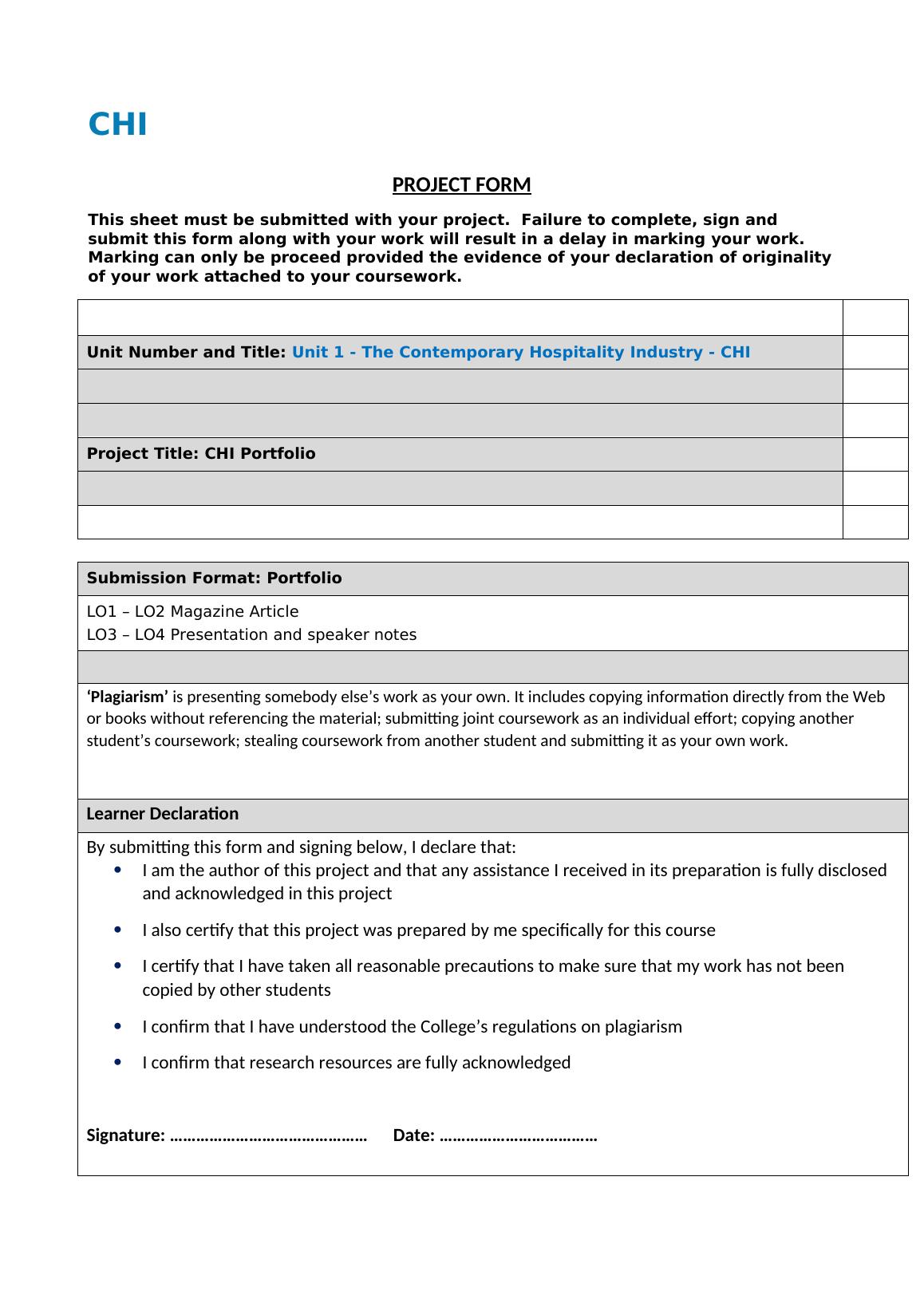
Project Brief and Guidance:PART 1: Hospitality Magazine Article (Individual work) LO1 - LO21.A list or chart showing different industry sectors with the type of establishments in each, including tourism organisations that are linked to the Hospitality sector.List of different industry sectors and establishment types are as follows:1.Hotel industry: This mainly deals with lodging and accommodation services and is directly impactingthe businesses for all types of tourists like leisure travellers, long stay travellers, special travellersetc. For e.g.Intercontinental Hotels Group is known for its large accommodation in almost 100countries and including 800,000 guest rooms with approximately 5000 hotels.2.Food and Beverages industry: This is essential for engaging in preparation and presentation of foodsand beverages to attract customers' attention. It helps in improving the customers' services. For e.g.Coal Shed London ad Brighton, which is famous for steak and seafood restaurant3.Travel and Tourism: This deals with people who are on move and is either formal or informal modes(Dikova and Brouthers, 2016). For e.g. Thomas Cook is one of the established tour operators whichfocus on planning the entire travelling plan for tourist to make their travelling convenient andeasier.4.Recreational sector: This is based on relaxation and enjoyment activities for bringing rest and funduring a stay in either hotel or resort. For e.g. participatory activities like swimming classes,bowling, movie theatres, cookery events, golf or playing casinos.
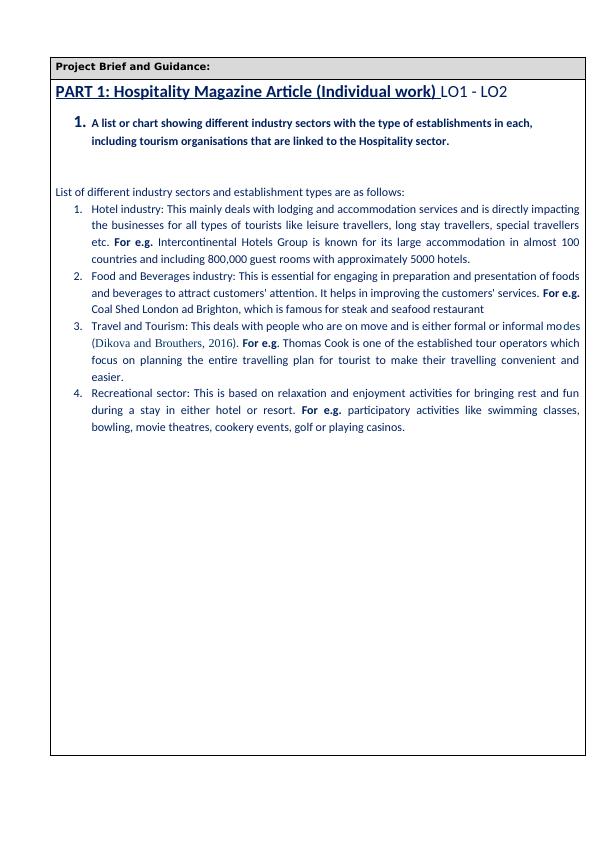
2.Size of the industry and its impact and contribution to the UK Economy (Guidance: you might want to provide figures, graphs/charts and statistics for the importance of the hospitality industryto the UK and international economies). These will illustrate your statements. Look at years 2016,2017 to 2018. Include an analysis of the contribution to the global development of the industry.Answer: Hospitality industry is defined as the service industry which reflects upon several fields likeaccommodation, food and drinks services, travelling and event planning, etc. for promoting tourism at bothlocal and global levels. It has drastic impact on the economic factors of United Kingdom, which is going toattain 257 billion British pounds by the year 2025. It involves tax revenues, profits and sales with focus onemployment generation and more. This constitutes approximately 10 percent of total Gross DomesticProduct of UK (Vamvakidis, 2018). From the below graph, it is clearly demonstrated that the hospitalityindustry has accelerated the GDP in leaps and bounds. Additionally, its showcased total attainable valuethat was 203 billion British pounds in 2016, 213.8 billion British pounds in 2017 and 220 billion Britishpounds in 2018 respectively. These statistics indicated the forwarding profits generation from thehospitality sector of UK.In regard to this, there are several factors like inflation rate, economic growth rate, currency rate that act as drivingforces to maintain the economic growth and assist in expanding the hotel chains either through franchising orIllustration 1: Graph presenting the total contribution of travel and tourism to GDP of UnitedKingdom(Source:Total contribution of travel and tourism to GDP in the UK, 2019)
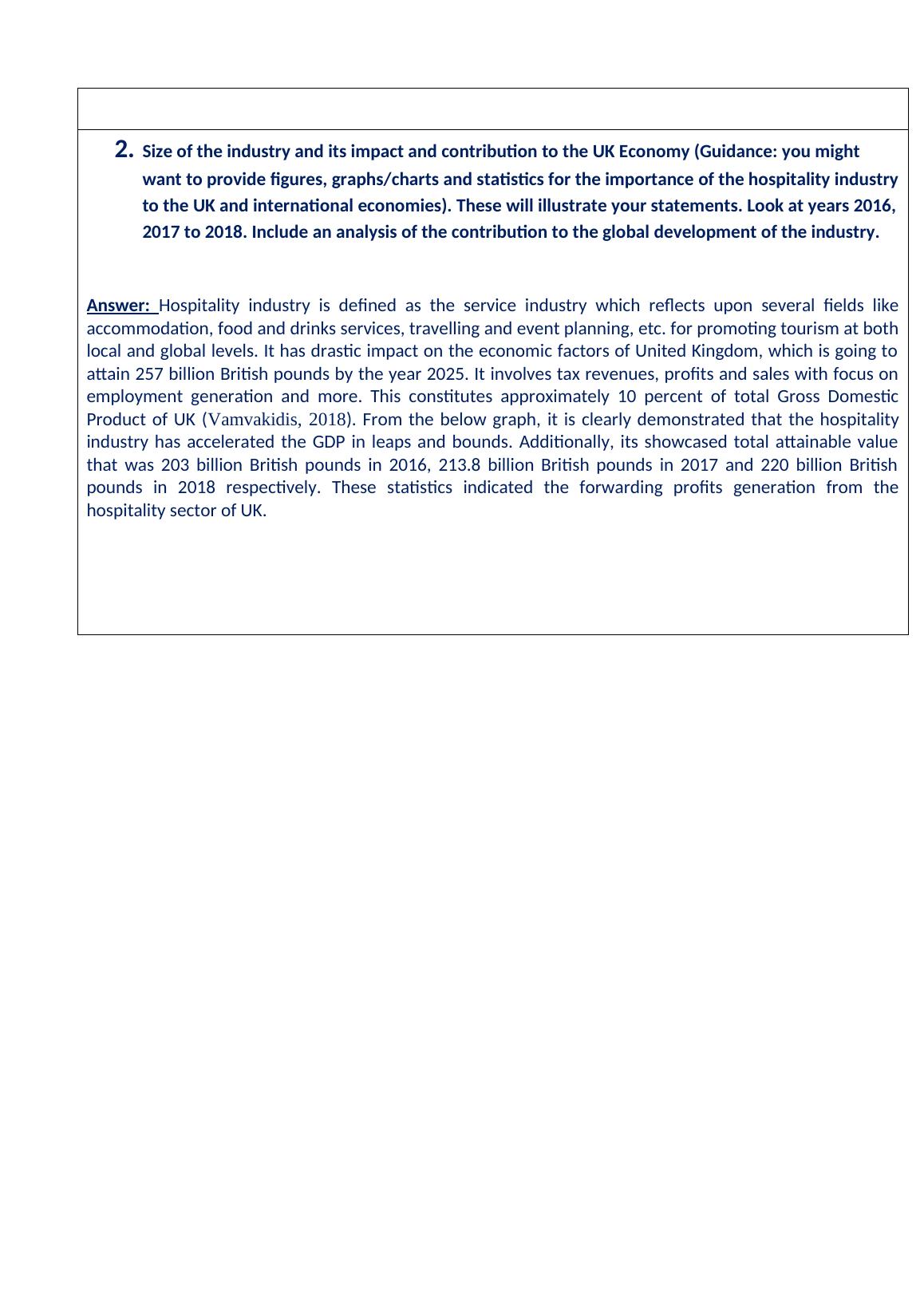
mergers and acquisitions. Moreover, this aids in maintaining the revenue management by evaluating theperformance of the taskforce.3.Give an example of licencing or franchising for a business of your choice and analyse its contribution to the economic worth of the industry.Franchising is defined as the relationship for business expansion in distributing goods and services. Itscontribution is immense to the economic worth of the hospitality industry with expansion plans andinternationalizing the operational activities. It is significant due to onset of globalization that leads usingstrategic planning in terms of profits and rise of expansion with respect to number of hotels, taskforce,availability of services and more in the potential markets for reaching the desired goals and objectives(Bowie and et.al., 2016).For e.g. Intercontinental Hotels Group (IHG) is headquartered in Denham and is dealing with several brandssuch as Hotel Indigo, Holiday Inn, Crowne Plaza etc. Its franchising consists of purchasing of Holiday InnFamily which made Crowne Plaza as one of its brands in the year 1990. Additionally, there is a formation ofPriority Club Rewards which has over 60 million members and make it as the largest loyalty program of thehotel in the world.4.Three examples of products or services indicating their nature, whether tangible or not.Food: This is tangible product which is based on providing nourishment aspects of the targeted audienceSpa sessions: This is tangible product which is based on recreational activity and is focusing on relaxation ofbody and mind of the customers'.Brand image: This is intangible product and mainly deals with making a lasting impression on the minds of the customers', investors and shareholders.
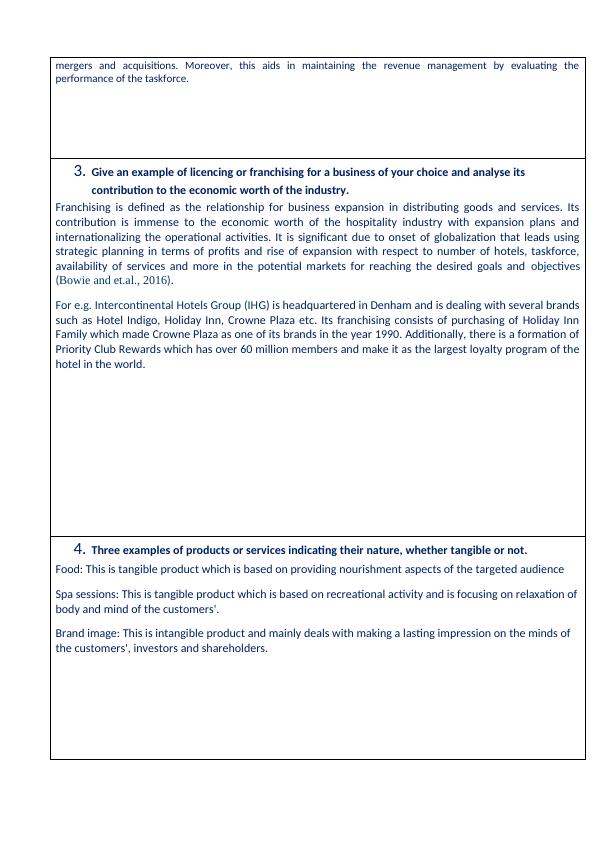
5.Review the inter-relationships between functional and operational departments in a hotel of yourchoice.Inter-relationships between the several departments is imperative in maintaining the brand image of IHGGroups. There are core operational and functional departments which are required to work together tounderstand the inventory management and overall specificity to fulfil clients' expectations. In this regard,good communication channels and open interaction is necessary to fulfil the clients' requirements anddesires (Espino-Rodríguez and Gil-Padilla, 2015). For instance, front office (functional) must be in syncwith housekeeping (operational) to give details about the check ins and outs in order to maintain thehygiene and replacement of any lighting, security checks etc. Moreover, HR department (functional) and ITdepartment (operational) also work together to maintain and safeguard the privacy and security of thecustomers'. HR department has the employees' details and other legislations for implementing the policymaking properly. Herein the IT department helps in making the hotel's interface robust and secured fromany hacking, phishing or malicious activities. Thus, both functional and operational activities are importantto make the working practices of IHG effective and proficient. 6.Using the template given to you, provide an overview of the type of staff and skills required in theindustry, showing skills gaps, the impacts they can have on businesses and possible solutions to minimise them.Types of staff (at least three different staff roles)Skills requiredSkills gaps youcan identifyImpacts of these skills gaps on the industryReceptionisGood interpersonal Lack of detailing and This leads to reputational risk in context to the brand image among the customers' and also
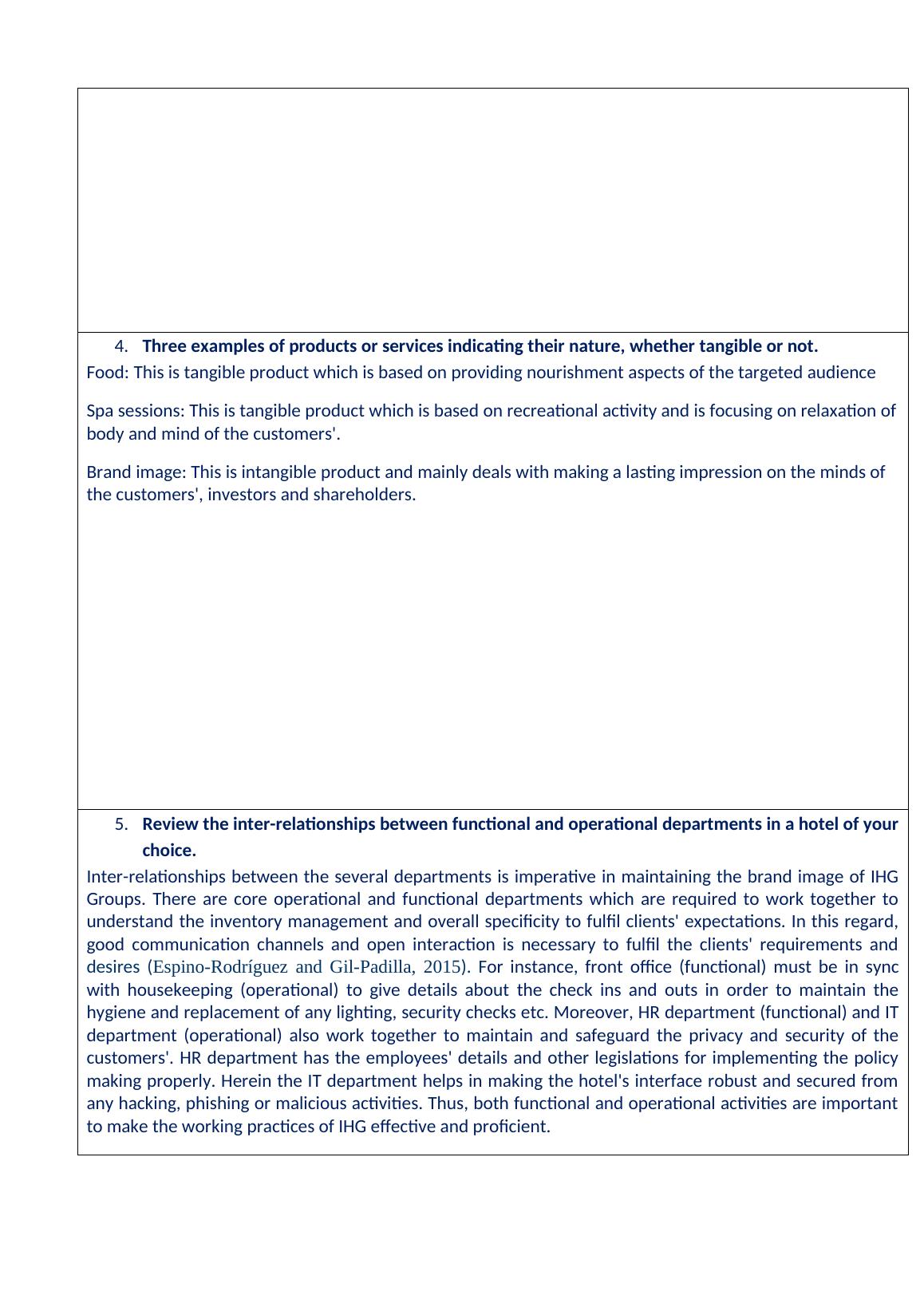
tskills, computer literacy for bookings with typing speedmis management with other departments during guest arrivalleads to conflicts and affect the team building spirit among the employeesHousekeeping SupervisorTime management skills, good communication skills with high motivated levelsLack of trainingregarding cleaning tools, products and others, no understanding of implementing the safety proceduresThis affects the cleaning of products that are made available to the customers' of the hotel and leave the premises without any proper sanitation and hygiene.This impacts and influences the customers to visit the hotel again (Kennedy, 2019)Chef Good culinary skills, proper knowledge on using several ingredients and materials with good presentation skills to make lasting impressionLack of using equipments and hi end products such as pasta makeror torches for making desertsHerein it makes or breaks the overallimpression on customers mind becausefood is the ultimate gateway to gain the loyalty of customers and push them to re visitPART 2: Presentation (Group work) LO3 – LO4 INSERT HERE THE GROUP PRESENTATION (Slides or pictures of your flipchart presentation)Your presentation will feature:-PESTLE Analysis of the chosen organisation
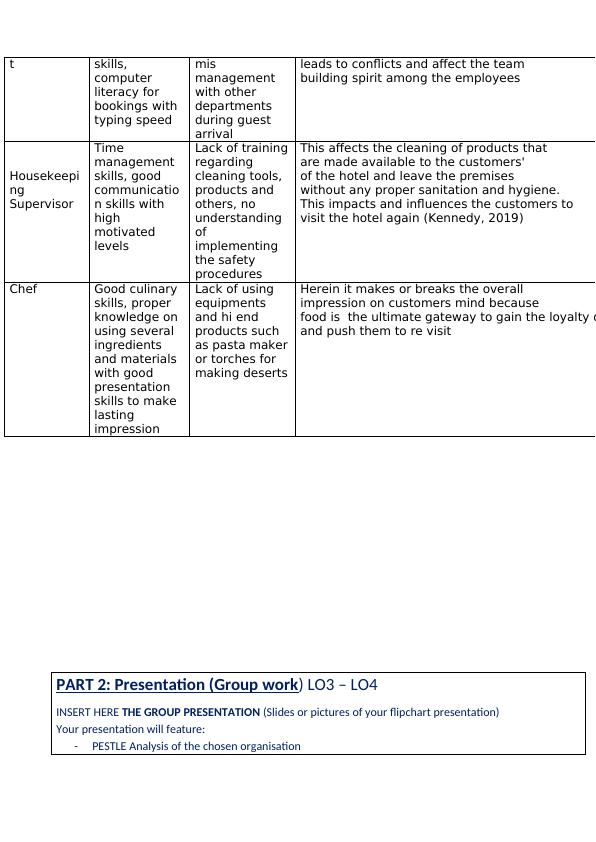
End of preview
Want to access all the pages? Upload your documents or become a member.
Related Documents
The Contemporary Hospitality Industry- Assignmentlg...
|15
|3243
|358
TOM Assignment Submission Formlg...
|20
|5368
|60
Hospitality Management Structurelg...
|15
|3700
|30
RDO Workbook Assignment Submission Formlg...
|19
|3438
|225
Assignment Submission Form for FHI-WORKBOOKlg...
|27
|5755
|132
An investigation into the economic, cultural, and ethical impact of Globalisation on business functions within organisationslg...
|32
|5999
|80
